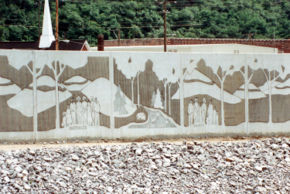Historic Matewan
The Legacy

By Paula Blankenship
Matewan, West Virginia is a small town nestled in the Tug River Valley, rich in its history of coal mining and ties to its past through the legacies of the infamous Hatfield’s & McCoy’s and the Matewan Massacre.
The people of Matewan are resilient people who have seen the town boom during the coal mining era, demolished during floods and the ensuing federal projects to protect the town from flooding, and are again in a rebuilding stage to preserve not only their town and livelihoods, but also their history.
Although there have been many family feuds over the history of the United States that have been longer and bloodier, none have captured the imagination of the American people as the Hatfield & McCoy Feud. This was mostly due to the burgeoning American press, who sent reporters in to talk to the families, take photographs, and sensationalize the whole affair.
Many locals feel that the Hatfield & McCoy Feud was actually a result of the Civil War. Anderson Hatfield, known as “Devil Anse” fought for the Confederacy, and Randall McCoy fought for the Union. The Civil War saw both sides fighting against neighbors and friends, and rumors were rampant about who shot whom during the battles. Feelings ran high after the war, so it is not far fetched to believe that something as simple as a misplaced pig was the straw that broke the camel’s back. The Tug River area along the West Virginia and Kentucky borders saw the beginnings of this deadly feud. Devil Anse Hatfield’s home was located on the West Virginia side of the river near Matewan, and he owned many acres of farmland along the banks of the Tug River, much of which in later years, he sold to the Norfolk and Western Railroad. Randall McCoy’s home was located on the Kentucky side of the Tug River.
If Devil Anse Hatfield and Randall McCoy were alive today they would be surprised to see what has happened to their legacy. Many of the local residents can trace their ancestry back to these two proud men. While some will talk freely and proudly of this past, many would be glad if history forgot it ever happened.
The Matewan Massacre, as it is now called, on May 19,1920 was the beginning of the modern day coal mining industry. It has gone down in history as possibly one of the deadliest single shootout’s in the United States, and the turning point for the modern day United Mine Workers of America. The coal company’s hired the Baldwin-Felt’s Security Agency to evict local miners, who had joined the newly formed Local of the UMWA, from their company homes. The miners got word of this, and met the team at the Matewan Train Depot. There ensued a shoot-out that left nine men dead and changed the future of coal mining forever.
The National Park Service has designated the town of Matewan as a Historical Landmark because of these events. The town has been working hard to preserve as much of its past as it can, and is becoming quite a tourist attraction. The Matewan Development Center, which was founded by coal companies, the local bank, area businesses, and local citizens, has undertaken the restoration of the town and the preservation of its history. Thanks to their efforts, the town now looks as it did in the 1920’s. They have developed a small museum of their past, and offer tours of the area. Next door to the Matewan Development Center, sits a cozy little restaurant called the Matewan Depot that promotes the theme of the train station. There you can enjoy a home cooked meal and view some of the town treasures while watching modern day trains rumble by. The floodwall, which has recently been completed by the U.S. Army Corps of Engineers, has become a major tourist attraction in itself. The history of the town from its beginnings to its present is engraved on the outside of the wall.
The Town of Matewan is thriving on its local citizen’s dedication to preserving their heritage so that future generations can learn from the successes and pitfalls of their past. They are proud of their place in history and dedicated to seeing that this American legacy lives on in the hills of West Virginia.
http://www.matewan.com/
http://www.matewan.org/
http://visitmatewan.com/